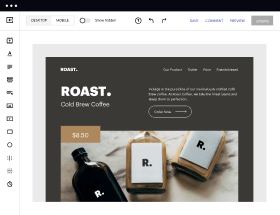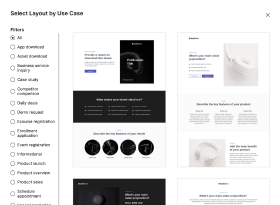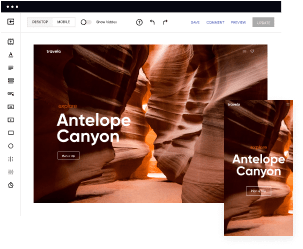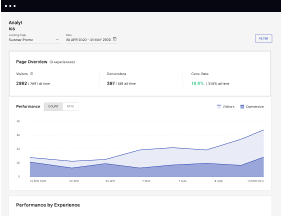Get flawless functionality on Chrome OS by using our optimized 404 error page template
Customize your Chrome OS-optimized 404 error page template for a flawless user experience. Get started now!

Easy to build without coding
With the intuitive drag-and-drop builder, anyone on your team can create high-converting pages without any knowledge of code or design. Make enhancements to your landing page with custom widgets using Javascript, HTML/CSS, or third-party scripts.
Multiple layouts for any industry and goal
Select from 500+ landing page layouts built to boost conversions across industry-specific scenarios. Customize them by adjusting fonts, adding images, and generating on-brand content with the AI assistant. Quickly scale with Instablocks® and Global Blocks that you can save, reuse, and update globally.
Loads fast and looks polished on any device
Every template is responsive, which means they present professionally on any device and load blazingly fast with our Thor Render Engine. You can also power them up with Google AMP technology to deliver an unparalleled mobile experience and drive higher conversions.
Robust analytics & experimentation
Get real-time updates and reporting across all your devices, showing the number of visitors, conversions, cost-per-visitor, and cost-per-lead. Launch AI-powered experiments, run A/B tests, and use heatmaps to analyze user behavior, then optimize your landing page to maximize conversions.
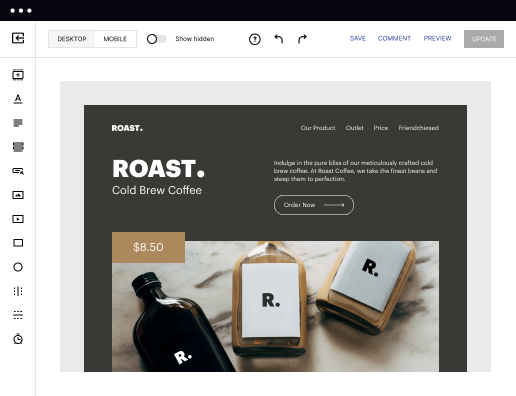
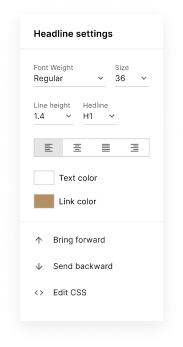
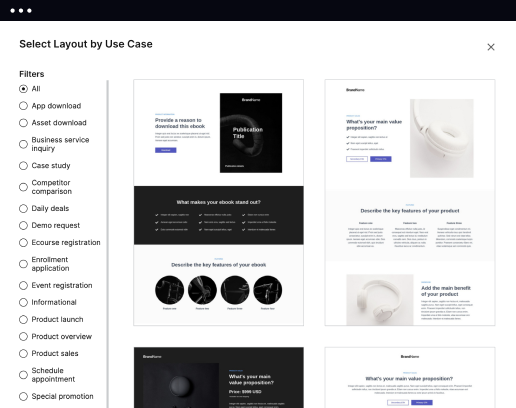
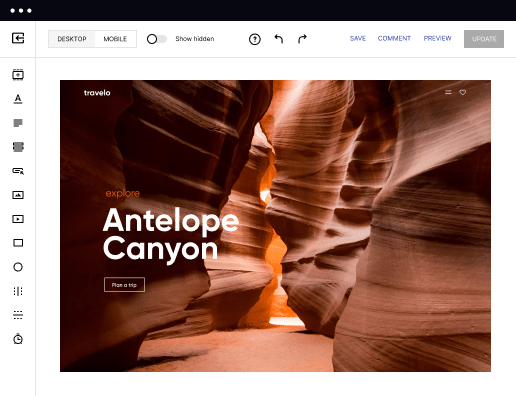
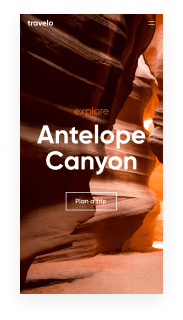
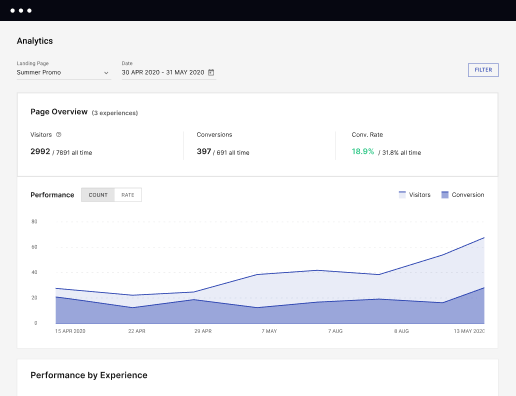
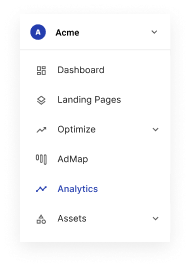
Easy to build without coding
With the intuitive drag-and-drop builder, anyone on your team can create high-converting pages without any knowledge of code or design. Make enhancements to your landing page with custom widgets using Javascript, HTML/CSS, or third-party scripts.
Multiple layouts for any industry and goal
Select from 500+ landing page layouts built to boost conversions across industry-specific scenarios. Customize them by adjusting fonts, adding images, and generating on-brand content with the AI assistant. Quickly scale with Instablocks® and Global Blocks that you can save, reuse, and update globally.
Loads fast and looks polished on any device
Every template is responsive, which means they present professionally on any device and load blazingly fast with our Thor Render Engine. You can also power them up with Google AMP technology to deliver an unparalleled mobile experience and drive higher conversions.
Robust analytics & experimentation
Get real-time updates and reporting across all your devices, showing the number of visitors, conversions, cost-per-visitor, and cost-per-lead. Launch AI-powered experiments, run A/B tests, and use heatmaps to analyze user behavior, then optimize your landing page to maximize conversions.
All the features you need to build lead-generating landing pages
Explore more featuresLearn how to build top-performing landing pages for any goal
FAQs
Leading the way in building high-performing landing pages





A step-by-step guide to maximizing your ROI with Instapage
When it comes to enhancing your digital marketing campaigns, Instapage stands out as the most powerful landing page and CRO platform. This guide provides a comprehensive understanding of how to accelerate, optimize, and scale your marketing efforts through effective landing page strategies tailored for various industries including business services, marketing and advertising, tech/SaaS, education, energy utilities, financial services, government, and insurance in the USA.
Understanding Instapage's value proposition
Instapage equips marketers with essential tools to elevate their campaigns. Understanding the nuances of landing pages, templates, personalization, optimization, and collaboration is key to maximizing your digital marketing efforts. Let's dive deeper into how these features can empower your marketing strategy.
- Templates & Lead Generation Elements: With over 100 high-converting templates, creating landing pages becomes a straightforward task. These elements are designed to capture leads effectively, helping you achieve your marketing goals.
- Landing Page Flexibility: Instapage's user-friendly interface allows marketers to build pages quickly without needing coding skills, enhancing both productivity and creativity.
- Optimization Tools: By utilizing built-in experimentation features like A/B testing and detailed heatmaps, marketers can make data-driven decisions to boost conversions.
Step 1: Selecting the right template
Choosing the right template is crucial. Start by identifying your campaign's goals. Are you looking to generate leads, increase sales, or promote an event? Select a template that aligns well with your objectives and brand identity. Here are some guidelines:
- Consider your audience's preferences: Tailor your template choice to match the interests and behaviors of your target audience for optimal engagement.
- Match the landing page to your ad: Ensure the template resonates with the ad content, maintaining consistency across your marketing messages.
- Keep it simple: A clean, uncluttered design tends to convert better, reducing cognitive overload for visitors.
Step 2: Customizing your landing page
With your template selected, it's time to customize it to reflect your brand's unique voice. Focus on:
- Dynamic Text Replacement: Modify key phrases to resonate with specific audience segments, enhancing relevance and personalization.
- Effective CTAs: Craft compelling calls-to-action that clearly guide users on the next steps, increasing the likelihood of conversion.
- Visual Elements: Use high-quality images and videos to engage visitors. Visual storytelling can significantly impact user experience.
Step 3: Analyzing Performance Metrics
Post-launch, analyzing the performance of your landing pages is vital. Use Instapage's built-in analytics dashboard to monitor key metrics, such as conversion rates and bounce rates, and adjust your strategies accordingly.
By following these steps, marketers can effectively use Instapage to enhance their digital campaigns and drive higher ROI. Remember, continuous testing and optimization play a central role in achieving sustained success.
Ready to transform your marketing strategy? Sign up for Instapage today to access the tools you need for powerful landing page creation and optimization.
People also ask about 404 error page template optimized for Chrome OS
404 error page template optimized for chrome os
The digital landscape: understanding 404 errors in the context of chrome os
Navigating the digital world often leads users to unexpected encounters, particularly the infamous 404 error page. This error signifies that the server could not find the requested resource, and it's crucial to address how this impacts user experience, especially for those using Chrome OS. Given that Chrome OS users often engage with their devices through web applications, a seamless experience is essential. This article will explore how to design 404 error pages specifically tailored for these users.
The significance of the 404 error page in today’s web ecosystem
404 errors serve as a crucial part of web navigation, although their existence can be quite frustrating. They are encountered when a web page has been moved, deleted, or the URL has been mistyped. This error disrupts user journeys and leads to a loss of potential conversions. A more structured 404 page can mitigate some of this damage.
Definition of a 404 error: An HTTP status code indicating that the server cannot find the requested page.
The impact of 404 errors on user experience: Leads to visitor frustration and can diminish trust in the website.
Common reasons for encountering a 404 error include broken links, outdated URLs, and content removal without redirects.
Tailoring 404 error pages for chrome os users
When it comes to Chrome OS users, understanding their specific needs and behaviors is vital. Chrome OS is primarily utilized in educational and business environments, and users tend to prioritize speed and functionality. They use lightweight devices focused on cloud-based applications, making it essential that error pages do not disrupt their workflow.
Understand user demographics: Chrome OS users are often students or professionals who require quick access to information and minimize disruptions.
Operating systems affect user interaction, where Chrome OS users are accustomed to fast-loading pages and responsive designs.
Essential features of a 404 error page template optimized for chrome os
A well-designed 404 error page should be clean and minimalistic. Chrome OS users appreciate straightforward designs that allow them to access information quickly. Utilizing ample whitespace can instill a sense of calm, directing user attention to relevant navigation options. Including functional widgets can further minimize frustration.
Clean and minimalistic design: Use visuals that maintain clarity and direct users toward actionable items.
Functional widgets: Provide quick access buttons for home, help, and search, ensuring smooth navigation.
Custom messaging and humor: Craft a friendly tone that can ease frustration, potentially incorporating humorous messages to lighten the mood.
Technical implementation of a 404 error page code
Creating a 404 error page involves understanding both HTML structures and the integration of JavaScript. When coding a 404 page, ensure you include a clear message indicating the error and offering next steps. Best practices in semantics should be followed to aid search engines in understanding your page's purpose.
Basic HTML structure: Ensure semantic HTML is used for clarity and ease of understanding by search engines.
Leveraging JavaScript: Utilize JavaScript to enhance interactivity, such as creating dynamic search features.
Responsive design techniques: Make sure the page is functional and visually appealing across various devices, utilizing CSS effectively.
Optimizing 404 pages for increased user retention
To maintain user engagement, it is essential to address broken links and offer users alternative content. Implementing 301 redirects is crucial for preserving SEO value and guiding users to relevant content. Monitoring broken links should become a regular part of your website maintenance routine.
Creating redirects: Use 301 redirects to direct users away from broken links to relevant alternatives.
Engaging users with alternative content: Suggest related articles or recent posts that could capture their interest.
Utilize analytics: Track user interactions with your 404 pages and adjust your strategies based on data.
The psychological aspect of a well-designed 404 page
Understanding user expectations is essential when designing effective 404 pages. Users often seek immediate assistance when they land on an error page, leading to frustrations if not met. By incorporating empathy into the design, you can craft an experience that minimizes discontent and guides users back into the main content effectively.
Understanding user expectations: Responsive error pages provide immediate solutions or navigation options.
The back button dilemma: Provide intuitive widgets that prompt users to explore other sections, reducing the likelihood of using the back button and leaving the site.
Real-world examples of effective 404 error pages
There are several websites with exemplary 404 responses that can provide insights into effective design strategies. These use creative approaches to engage users right away, making them feel less frustrated and more inclined to continue exploring the site. Case studies reveal that a thoughtful 404 page can teach valuable lessons.
Analyzing websites: Explore leading pages with engaging and helpful 404 templates.
The transformation of 404 pages: Examine how website behavior trends have shifted over time and consider what future enhancements might emerge.
Wrapping up the 404 error page optimization strategy
As we conclude our discussion, it’s crucial for webmasters to focus on best practices when creating 404 pages. A well-designed error page can dramatically influence a visitor's continued engagement with the website. By using the strategies outlined in this guide, websites can build user trust and improve retention.
Review key takeaways: Focus on clean design, functionality, and empathy in your 404 pages.
Encourage best practices: Regularly review and update your 404 page strategies to stay relevant.
Foster community discussion: Engage with others in your field to share insights and discuss innovations surrounding 404 pages.
Ready to skyrocket conversions?
Supercharge your ad campaigns with high-performing landing pages
Get started



